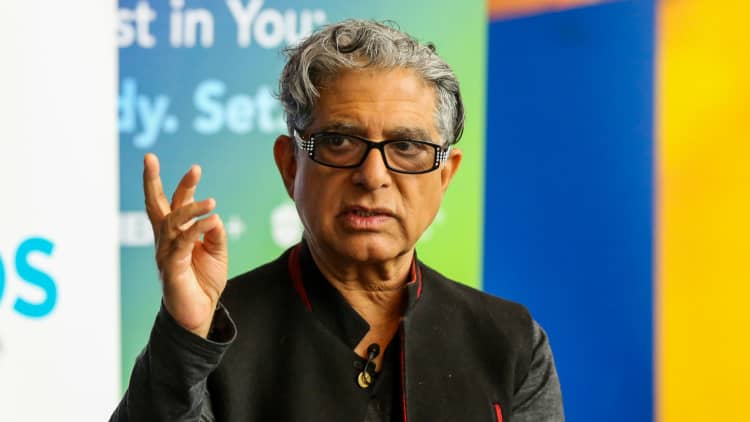Stress may be costing you in more ways than you realize. In addition to the physical and emotional toll of work-related stress, the strain could also be affecting you professionally.
Professionals who are overwhelmed at the office are more likely to miss work and be unhappy with their careers, a study of more than 22,000 employees found. If that sounds familiar to you, consider these four strategies that researchers say can help you start feeling less anxious:
1. Go for a quick walk
Even if you only have 10 minutes to take a break, get up and go for a walk.
Research conducted at Princeton University found that physical activity actually "reorganizes the brain so that its response to stress is reduced and anxiety is less likely to interfere with normal brain function."
And by being outside in nature (if you can) and getting some sunlight, you're more likely to decrease your levels of cortisol, a chemical produced when we are stressed.
Besides feeling more refreshed, taking a walk could help you think more creatively, Stanford researchers say.
2. Do a rhythmic breathing exercise
Marlynn Wei, a Harvard and Yale-trained psychiatrist, recommends a simple breathing exercise to relax while at the office.
"I do actually work with a lot of professionals who come to me to try to reduce stress," Dr. Wei tells CNBC. "The first thing I tell them is a very portable, easy-to-use strategy. It's two to three minutes of simple, rhythmic-paced breathing," she says.
Here is Dr. Wei's strategy:
- Set a timer for two or three minutes.
- Focus on your breath.
- Take a deep breath through your nose while you count to five.
- Hold your breath for five counts.
- Exhale for five counts.
- Repeat for the remaining time, and notice how your breath becomes deeper.
Rhythmic breathing has a mental effect, says Dr. Wei, who co-authored "The Harvard Medical School Guide to Yoga." It draws your attention away from what is stressing you and toward what you're feeling, which has a calming effect. In addition, you trigger positive psychological changes.
3. Eat brain-boosting foods
A growing body of research shows that eating poorly makes people feel sluggish and less mentally sharp.
"Put simply, what you eat directly affects the structure and function of your brain and, ultimately, your mood," writes Harvard Medical School professor and board-certified doctor Eva Selhub.

Instead of reaching for a bag of candy or chips, try to kick your snack-machine habit. Researchers suggest eating foods such as yogurt, blueberries and walnuts boosts cognitive function and reduces memory loss overtime.
You could be doing your brain, not to mention your waistline, a big favor.
4. Put your phone away
Constant notifications from your phone, smartwatch or on your computer screen can make getting your work done extremely difficult. Some psychologists have even gone as far as to say that constant email notifications are a "toxic source of stress" simply because they never stop.
Richard MacKinnon, a medical doctor who studies the effects of email on anxiety and worker happiness, found clear correlations between more frequent use of email and a higher sense of feeling pressured.
"Our research shows that email is a double-edged sword. Whilst it can be a valuable communication tool, it's clear that it's a source of stress of frustration for many of us," says MacKinnon in a press release.
If you can find certain times during the day to put your phone away, it could help you concentrate. If missing important messages worries you, you can adjust your smartphone settings to let calls from certain people ring. Or you could simply put your phone on silent and check it once per hour or once every few hours, depending on how many people need to reach you. This way, constant alerts won't bug you.
Finally, talking with others is shown to help people better respond to manage stress. If you're worried about your mental health at work, consider talking with a counselor or a trusted family member or friend.
For more ideas on how to relax, check out how billionaires Warren Buffett, Oprah Winfrey and others de-stress.



